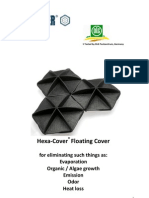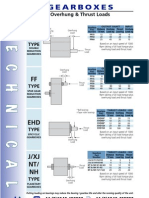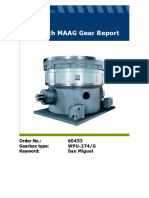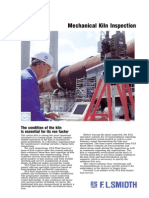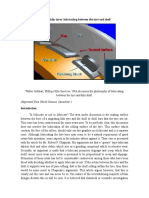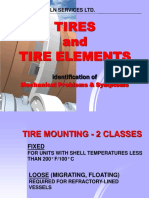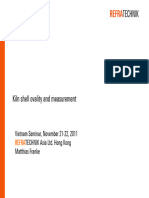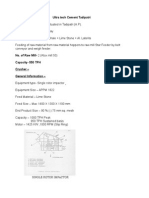0 ratings0% found this document useful (0 votes)
52 viewsFrigate Flyer Kiln Inlet Seal
Frigate Flyer Kiln Inlet Seal
Uploaded by
watcharpThe document discusses a kiln inlet seal that compensates for secondary movement of the kiln. It absorbs three types of movements through a 5-ply membrane instead of a gasket, requiring less maintenance while providing an absolutely tight seal. The seal must withstand axial shifting, excentric shifting, and pendulum movement to guarantee optimum air-tightness with minimal upkeep.
Copyright:
© All Rights Reserved
Available Formats
Download as PDF, TXT or read online from Scribd
Frigate Flyer Kiln Inlet Seal
Frigate Flyer Kiln Inlet Seal
Uploaded by
watcharp0 ratings0% found this document useful (0 votes)
52 views1 pageThe document discusses a kiln inlet seal that compensates for secondary movement of the kiln. It absorbs three types of movements through a 5-ply membrane instead of a gasket, requiring less maintenance while providing an absolutely tight seal. The seal must withstand axial shifting, excentric shifting, and pendulum movement to guarantee optimum air-tightness with minimal upkeep.
Copyright
© © All Rights Reserved
Available Formats
PDF, TXT or read online from Scribd
Share this document
Did you find this document useful?
Is this content inappropriate?
The document discusses a kiln inlet seal that compensates for secondary movement of the kiln. It absorbs three types of movements through a 5-ply membrane instead of a gasket, requiring less maintenance while providing an absolutely tight seal. The seal must withstand axial shifting, excentric shifting, and pendulum movement to guarantee optimum air-tightness with minimal upkeep.
Copyright:
© All Rights Reserved
Available Formats
Download as PDF, TXT or read online from Scribd
Download as pdf or txt
0 ratings0% found this document useful (0 votes)
52 views1 pageFrigate Flyer Kiln Inlet Seal
Frigate Flyer Kiln Inlet Seal
Uploaded by
watcharpThe document discusses a kiln inlet seal that compensates for secondary movement of the kiln. It absorbs three types of movements through a 5-ply membrane instead of a gasket, requiring less maintenance while providing an absolutely tight seal. The seal must withstand axial shifting, excentric shifting, and pendulum movement to guarantee optimum air-tightness with minimal upkeep.
Copyright:
© All Rights Reserved
Available Formats
Download as PDF, TXT or read online from Scribd
Download as pdf or txt
You are on page 1of 1
How FRIGATE Kiln Inlet Seal compensates the secondary movement of the kiln
FRIGATE TEKNOLOGIES PRIVATE LIMITED
Gr. Floor, No. 9; Block # 5
Eros Garden; Charmwood Village; Surajkund Road
Faridabad 121 001; Haryana; India
Tel
Fax
URL
+91-129-4116470
+91-11-66173981
office@frigate.in
www.frigate.in
Inlet Seal (Rotary Kiln)
ADVANTAGES
Perfect contact between rotating and fixed flange
Exact absorption of the three movements
5-ply membrane of different materials instead of a gasket
Less maintenance
Result: absolutely tight
Excentric, axial and sliding movements of rotary kilns are compensated and thus
we can guarantee optimum air-tightness with minimal maintenance.
MECHANICAL REQUIREMENTS. Seal must withstand:
- Axial shifting
- Excentric shifting
- Pendulum movement
SEALING PROBLEMS
- Entering of cold air - Limitation of thermal capacity
- Condensation of volatile matter - Build-up & coating
- Kiln dust spillage
You might also like
- Goodyear Conveyor HandbookDocument298 pagesGoodyear Conveyor Handbooksasha_seferovic187496% (28)
- Trunnion Bearing ClearanceDocument1 pageTrunnion Bearing ClearanceJuanPabloGonzalezFiblas0% (1)
- 36 KGD Presentation en APCAC2011Document20 pages36 KGD Presentation en APCAC2011Gonzalo Ale Olave A.No ratings yet
- Belt Conveyor Design-DunlopDocument161 pagesBelt Conveyor Design-Dunlopadi_ganteng12100% (36)
- Comparison Chart Id Fan: New 25.1 Lacs EachDocument6 pagesComparison Chart Id Fan: New 25.1 Lacs EachJKKNo ratings yet
- Gitrh Gear VibrationsDocument5 pagesGitrh Gear Vibrationsgullipalli srinivasa raoNo ratings yet
- Hexa-Cover (R) Floating Cover Brochure AgricultureDocument5 pagesHexa-Cover (R) Floating Cover Brochure AgriculturehexacoverNo ratings yet
- Requisition: FOR Hot Kiln Alignment & Girth Gear InspectionDocument5 pagesRequisition: FOR Hot Kiln Alignment & Girth Gear InspectionAhmad Husni RizalNo ratings yet
- Preheater Fan Coating ProblemDocument7 pagesPreheater Fan Coating ProblemAnonymous Cxriyx9HIXNo ratings yet
- Graphite Blocks - Gear Lubricant - Rotary Kilns - PKSEDocument7 pagesGraphite Blocks - Gear Lubricant - Rotary Kilns - PKSEliofasNo ratings yet
- ESPDocument15 pagesESPlrpatraNo ratings yet
- Support Roller Adjustments: IKD Webinar Training by John RossDocument31 pagesSupport Roller Adjustments: IKD Webinar Training by John Rosspasha100% (1)
- VRM Roller Bearing FailureDocument39 pagesVRM Roller Bearing FailureReda M.SalemNo ratings yet
- Gearboxes: Overhung & Thrust LoadsDocument8 pagesGearboxes: Overhung & Thrust LoadswhatcaniputNo ratings yet
- Ikn Bee - Meet Ikni r12Document28 pagesIkn Bee - Meet Ikni r12Junaid MazharNo ratings yet
- Method Statement Repair of Cracked Kiln TyreDocument62 pagesMethod Statement Repair of Cracked Kiln TyreSalah RomdaniNo ratings yet
- Bucket Elevator: Albano, Mar Jarryd Sasing, Wilbert Merafuentes, Andrew Corilla ReylandDocument16 pagesBucket Elevator: Albano, Mar Jarryd Sasing, Wilbert Merafuentes, Andrew Corilla ReylandAndrew Merafuentes50% (2)
- Failure Mode and Effect Analysis of Journal BearingDocument7 pagesFailure Mode and Effect Analysis of Journal BearingMuhammad Kurniawan100% (1)
- Tire Migration Measurement & Information 17042019Document2 pagesTire Migration Measurement & Information 17042019Zegera MgendiNo ratings yet
- Kiln Readings 23 06 17Document4 pagesKiln Readings 23 06 17zain140No ratings yet
- Tire CreepDocument3 pagesTire Creepnazmul hasan0% (1)
- 2.2 - ICR DEC 05 - Fractured Kiln WeldingDocument3 pages2.2 - ICR DEC 05 - Fractured Kiln WeldingKreshnik StratiNo ratings yet
- DALOG Training - Data AnalysisDocument67 pagesDALOG Training - Data AnalysisDede Kaladri100% (1)
- To Weld or Not To Weld The Face of Kiln RollersDocument3 pagesTo Weld or Not To Weld The Face of Kiln RollerssreeganeshrNo ratings yet
- Shutdown Maintenance Activites at Mechanical Clinker (Line-1)Document4 pagesShutdown Maintenance Activites at Mechanical Clinker (Line-1)salman saleemNo ratings yet
- 2020 - 07 - SZS WPU 274Document12 pages2020 - 07 - SZS WPU 274pinion gearNo ratings yet
- Mech Kiln InspectionDocument2 pagesMech Kiln InspectionMohamed ShehataNo ratings yet
- Safe Operation of Kilns, Furnaces & Driers: A Tool Kit For BusinessDocument23 pagesSafe Operation of Kilns, Furnaces & Driers: A Tool Kit For BusinessAdewaleNo ratings yet
- Kiln Services Resurfacing of Rollers and TyresDocument4 pagesKiln Services Resurfacing of Rollers and TyresAPINo ratings yet
- Rotary Vessel Mechanical MaintenanceDocument6 pagesRotary Vessel Mechanical Maintenanceritesh shrivastavNo ratings yet
- 2a. Fan Selection Basics R4BDocument16 pages2a. Fan Selection Basics R4BPhanhai Kaka100% (1)
- Rotating Kiln TyresDocument40 pagesRotating Kiln TyresGilberto PérezNo ratings yet
- S3 Product Range - EnglishDocument35 pagesS3 Product Range - EnglishJuan Esteban Luque ZegarraNo ratings yet
- Tilting Pad Jour Bear PDFDocument4 pagesTilting Pad Jour Bear PDFMansoor AliNo ratings yet
- 2 Pier AlignmentDocument27 pages2 Pier AlignmentemadsabriNo ratings yet
- Hot Kiln SurveyDocument2 pagesHot Kiln SurveyHenok Moges KassahunNo ratings yet
- 5 Kiln Bearings PDFDocument60 pages5 Kiln Bearings PDFBülent BulutNo ratings yet
- Kiln Miscellaneous PDFDocument69 pagesKiln Miscellaneous PDFAhmad NilNo ratings yet
- Fluidised Bed SeederDocument11 pagesFluidised Bed SeederAmritanshu ManuNo ratings yet
- Holderbank: Binder 1 Materials Technology IDocument2 pagesHolderbank: Binder 1 Materials Technology IlatiefNo ratings yet
- Welding Alloys Cement-BrochureDocument11 pagesWelding Alloys Cement-Brochureengr kazamNo ratings yet
- FEB 14, 2020 Top 5 Critical Maintenance Issues For Rotary KilnsDocument4 pagesFEB 14, 2020 Top 5 Critical Maintenance Issues For Rotary KilnsCarlos Ramón Plazaola LorioNo ratings yet
- 04 General Frames Pedestals Lower HousingDocument13 pages04 General Frames Pedestals Lower HousingDavid Vilca MamaniNo ratings yet
- Luoyang Jiecheng Bearing Technology Co., LTD: PrefixesDocument5 pagesLuoyang Jiecheng Bearing Technology Co., LTD: PrefixesAnand ChinnakrishnanNo ratings yet
- Tires and Tire ElementsDocument20 pagesTires and Tire ElementsRamsai ChigurupatiNo ratings yet
- OvalityDocument17 pagesOvalityquỳnh lêNo ratings yet
- 2 Girth Gear Asset ManagementDocument32 pages2 Girth Gear Asset ManagementAnesu ChimhowaNo ratings yet
- 6.1 Consequences of Misalignment of Kiln and Evaluation of of Misalignment of KilnDocument22 pages6.1 Consequences of Misalignment of Kiln and Evaluation of of Misalignment of Kilnritesh shrivastavNo ratings yet
- 1 Exemplary Technical Report 2012 PDFDocument99 pages1 Exemplary Technical Report 2012 PDFMKPashaPashaNo ratings yet
- Chute Design Considerations For Feeding and TransferDocument19 pagesChute Design Considerations For Feeding and Transferovunctezer100% (1)
- Uiw Bucket Elevator Ansi Bem0308 r21Document42 pagesUiw Bucket Elevator Ansi Bem0308 r21annccknarimeNo ratings yet
- Lubrication PDFDocument123 pagesLubrication PDFFran JimenezNo ratings yet
- Ultra Tech Cement TadipatriDocument18 pagesUltra Tech Cement TadipatriAshutosh SinghNo ratings yet
- KILn Tyre FailureDocument5 pagesKILn Tyre FailureTarun AroraNo ratings yet
- Heating Up Curve-Kiln BurnerDocument2 pagesHeating Up Curve-Kiln Burnerclau100% (1)
- Aeromats Aeropress Aeropress 10s Aerovac GeneralDocument2 pagesAeromats Aeropress Aeropress 10s Aerovac Generalsaket2006No ratings yet
- The Book of the Singer Junior - Written by an Owner-Driver for Owners and Prospective Owners of the Car - Including the 1931 SupplementFrom EverandThe Book of the Singer Junior - Written by an Owner-Driver for Owners and Prospective Owners of the Car - Including the 1931 SupplementNo ratings yet
- Pneumatic and Hydrautic Conveying of Both Fly Ash and Bottom AshFrom EverandPneumatic and Hydrautic Conveying of Both Fly Ash and Bottom AshNo ratings yet
- OME Application Guide - Katalog Zawieszenia OME - 10-2017Document165 pagesOME Application Guide - Katalog Zawieszenia OME - 10-2017promuxaiicNo ratings yet
- Catalogo OMEDocument168 pagesCatalogo OMEDiego Pineda100% (2)
- Wheel Loaders 621F 721F BrochureDocument4 pagesWheel Loaders 621F 721F BrochureIván Méndez AcostaNo ratings yet
- TruFrac Composite Frac PlugDocument4 pagesTruFrac Composite Frac PlugJOGENDRA SINGHNo ratings yet
- Superbolt CatalogDocument32 pagesSuperbolt CatalogwatcharpNo ratings yet
- Loesche Brochure LMDocument24 pagesLoesche Brochure LMwatcharpNo ratings yet
- Proposal Ref.:: Mr. Yeo Heng HongDocument2 pagesProposal Ref.:: Mr. Yeo Heng HongwatcharpNo ratings yet
- Presentation On Refractories By: Haleem Haider Farrukh Shahzad Muzammil JavedDocument23 pagesPresentation On Refractories By: Haleem Haider Farrukh Shahzad Muzammil JavedwatcharpNo ratings yet
- Review No. 110Document9 pagesReview No. 110mahreza189No ratings yet
- CastingDocument30 pagesCastingwatcharpNo ratings yet
- Metal CastingDocument113 pagesMetal CastingGopal Jetani100% (1)
- Conveyor Belt Maintenance Manual 2010Document46 pagesConveyor Belt Maintenance Manual 2010paul_lesberg100% (1)
- Belt Conveyor: Installation, Operation Maintenance Safety ManualDocument13 pagesBelt Conveyor: Installation, Operation Maintenance Safety Manualsomjit saranai100% (2)
- Fenner-Dunlop Conveyor Problems & SolutionsDocument18 pagesFenner-Dunlop Conveyor Problems & Solutionsmickey262010100% (1)






